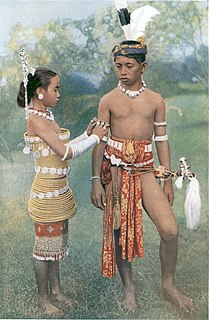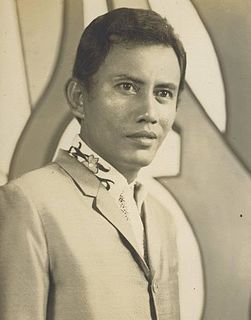| Dr Cornelis M. H. | |
|---|---|
 | |
| Governor of West Kalimantan | |
| In office 14 January 2008 –14 January 2018 | |
| President | Susilo Bambang Yudhoyono Joko Widodo |
| Preceded by | Usman Ja'far |
| Succeeded by | Dody Riyadmadji (acting) Sutarmidji |
| Personal details | |
| Born | 27 July 1953 Sanggau, West Kalimantan, Indonesia |
| Political party | PDI-P |
| Spouse(s) | Frederika, S.Pd |
Dr Cornelis M. H. (born 27 July 1953) is a West Kalimantan governor for 2008–2013 term. He graduated master of law at a university in Pontianak in 2004.

West Kalimantan is a province of Indonesia. It is one of five Indonesian provinces in Kalimantan, the Indonesian part of the island of Borneo. Its capital city is Pontianak. The province has an area of 147,307 km² with a recorded 2010 census population of 4,395,983 . Ethnic groups include the Dayak, Malay, Chinese, Javanese, Bugis, and Madurese. The latest official estimate is 4,546,439. The borders of West Kalimantan roughly trace the mountain ranges surrounding the watershed of the Kapuas River, which drains most of the province. The province shares land borders with Central Kalimantan to the southeast, East Kalimantan to the east, and the Malaysian territory of Sarawak to the north.

Pontianak is the capital of the Indonesian province of West Kalimantan, founded by Syarif Abdurrahman Alkadrie as a capital of Sultanate of Kadriyah on 23 October 1771 / 14 Rajab 1185 AH. Syarif Abdurrahman Alkadrie developed Pontianak as a trading port on the island of Borneo, occupying an area of 107.82 km² in the delta of the Kapuas River. It is located on the equator, hence it is widely known as Kota Khatulistiwa. The city center is less than 3 kilometres (2 mi) south of the equator. Pontianak is the 26th largest city in Indonesia in terms of population, as well as the fifth largest city on the island of Borneo in terms of population after Samarinda, Banjarmasin, Kuching and Balikpapan.
He has been accused by Agus Setiadji, leader of the United Malay People, of sidelining Malays and only giving government jobs and funds to Dayaks. [1] He was reelected once in 2013, and his second term expired on 14 January 2018. [2]

Malays are an Austronesian ethnic group and nation native to the Malay Peninsula, eastern Sumatra of Indonesia and coastal Borneo, as well as the smaller islands which lie between these locations — areas that are collectively known as the Malay world. These locations are today part of the nations of Malaysia, Indonesia, Brunei, Singapore, and southern Thailand.

The Dayak or Dyak or Dayuh are the native people of Borneo. It is a loose term for over 200 riverine and hill-dwelling ethnic subgroups, located principally in the central and southern interior of Borneo, each with its own dialect, customs, laws, territory and culture, although common distinguishing traits are readily identifiable. Dayak languages are categorised as part of the Austronesian languages in Asia. The Dayak were animist in belief; however, many converted to Islam and since the 19th century there has been mass conversion to Christianity.










